Eatwell Guide key to sustainable diets highlights BNF review paper

The research shows that following the government-backed healthy eating advice, such as the UK’s Eatwell Guide, can deliver environmental and health benefits but currently less than 1% of people are achieving all of the Eatwell recommendations.
A UK study found that following the Eatwell Guide’s recommendations more closely would lower the greenhouse gas emissions of current adult diets by 30%, reduce water use by 4% and reduce mortality risk by up to 7%.
Prof Judy Buttriss, director general of the BNF and co-author of the review said, “Looking at the available evidence we recommend that an obvious step is to work together with others in the field of nutrition and beyond to promote diets aligned with the UK’s Eatwell Guide.
“An advantage of this kind of plant-rich diet, which can still include some meat, fish, dairy products and eggs, is that it is based on dietary patterns already familiar in the UK and already being adopted to some extent by many of us. However, currently less than 1% of people are achieving all of the Eatwell Guide recommendations, and so there is room for improvement for almost all of us.”
The Eatwell guide recommends that people have a diet that is rich in foods from plants but to also include some meat, dairy, fish and eggs. A more sustainable diet requires a shift in food choices to include more plant-based foods including vegetables, fruit, beans, nuts and plant-based meat alternatives.
In the UK, intake of red and processed meat across the population has been falling and is already at an average of 56g per day amongst adults aged 19-64, within the limit suggested for health (less than 70 g/day on average across the week). However, around a third of people are still eating more red meat than recommended.
BNF suggests how to make diets healthier and more sustainable:
- Follow the Eatwell Guide: This style of diet will likely improve the health of the UK population by reducing the number of new cases of heart disease, stroke, cancer and type 2 diabetes.
- Eat more fruit and vegetables: Both are a good source of vitamins, minerals and fibre.
- Consume more plant-based proteins: People should aim to expand their choice of protein-containing foods to include more plant-derived sources, such as beans and other pulses, nuts, seeds and plant-based meat alternatives.
- Limit foods high in fat, salt or sugar: As well as being less healthy choices foods including cakes, biscuits, pies and pastries also contribute to greenhouse gas emissions associated with our diets.
- Choose sustainable sources of fish and seafood: Government advice in the UK is to eat at least two portions (140 g each) of fish per week, one of which should be an oily fish.
- Waste less food: It has been estimated that food losses and waste contribute as much as 10% of all GHGE globally.
